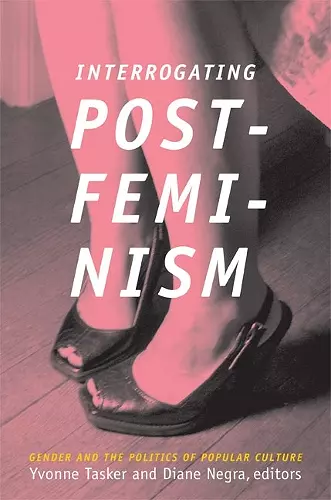Interrogating Postfeminism
Gender and the Politics of Popular Culture
Diane Negra editor Yvonne Tasker editor
Format:Hardback
Publisher:Duke University Press
Published:2nd Nov '07
Currently unavailable, and unfortunately no date known when it will be back

Feminist essays examining postfeminism in American and British popular culture.
Brings feminist critique to bear on contemporary "postfeminist" mass media culture, analyzing phenomena ranging from female action films to the "girling" of aging women in productions such as the movie Something's Gotta Give and the British television series 10 Years Younger.This timely collection brings feminist critique to bear on contemporary postfeminist mass media culture, analyzing phenomena ranging from action films featuring violent heroines to the “girling” of aging women in productions such as the movie Something’s Gotta Give and the British television series 10 Years Younger. Broadly defined, “postfeminism” encompasses a set of assumptions that feminism has accomplished its goals and is now a thing of the past. It presumes that women are unsatisfied with their (taken for granted) legal and social equality and can find fulfillment only through practices of transformation and empowerment. Postfeminism is defined by class, age, and racial exclusions; it is youth-obsessed and white and middle-class by default. Anchored in consumption as a strategy and leisure as a site for the production of the self, postfeminist mass media assumes that the pleasures and lifestyles with which it is associated are somehow universally shared and, perhaps more significantly, universally accessible.
Essays by feminist film, media, and literature scholars based in the United States and United Kingdom provide an array of perspectives on the social and political implications of postfeminism. Examining magazines, mainstream and independent cinema, popular music, and broadcast genres from primetime drama to reality television, contributors consider how postfeminism informs self-fashioning through makeovers and cosmetic surgery, the “metrosexual” male, the “black chick flick,” and more. Interrogating Postfeminism demonstrates not only the viability of, but also the necessity for, a powerful feminist critique of contemporary popular culture.
Contributors. Sarah Banet-Weiser, Steven Cohan, Lisa Coulthard, Anna Feigenbaum, Suzanne Leonard, Angela McRobbie, Diane Negra, Sarah Projansky, Martin Roberts, Hannah E. Sanders, Kimberly Springer, Yvonne Tasker, Sadie Wearing
“This collection is just what I’ve been looking for: a smart feminist analysis of the curious phenomenon of postfeminism. The editors and contributors provide ample and intelligent criticism of ‘commodity feminism’ and the lies of ‘self-empowerment’ in myriad makeover shows, plastic surgery ads, and female action films, without belittling the power, appeal, and sheer gusto of the myths of empowerment, diversity, and ‘girl power’ in contemporary culture. Interrogating Postfeminism demonstrates that announcements of the ‘death’ of feminism have been premature.”—Pamela Robertson Wojcik, author of Guilty Pleasures: Feminist Camp from Mae West to Madonna
“This is a benchmark text: rich, authoritative, timely. Bringing together work by key authors on most of the significant phenomena and genres of ‘postfeminist’ culture, it will convince readers of the necessity of confronting the term.”—Patricia White, author of Uninvited: Classical Hollywood Cinema and Lesbian Representability
“Interrogating Postfeminism, a productive and diverse collection of articles, usefully helps to fill a gap in film and media studies literature. . . . Overall, feminist film and media studies, cultural studies and women’s studies graduate students and scholars should welcome Interrogating Postfeminism. The articles go beyond the expected and open up numerous avenues for further investigation.” -- Michele Schreiber * Film Quarterly *
“The essays are written in a clear, politically-engaged style, and cohere well as a group. Collectively, they seek to clarify the term postfeminism and its connection to different waves and factions of feminist politics, and to explore how it can be more effectively used in media analysis. . . . the majority of essays are solid examinations of where postfeminist media analysis might go.” -- Becca Cragin * Journal of Gender Studies *
“This collection suggests that far from living in a clearly delineated post-feminist age, we are instead still in the process of negotiating this term. While literally, post-feminism suggests an era after feminism, and without the need for feminism, these contributors show, in their vast variety of interpretations of the term, that post-feminism is a term that can apply to those women who have benefited from feminism, as well as those who continue to maintain sexist traditional norms. However, all is not lost, as many of these essays suggest there is a blurring of the negative depictions of feminism in the way in which powerful women have come to be taken for granted. Feminism may be a movement that few women today wish to identify with, yet its effect on their lives and choices remains obvious and virtually impossible to deny.” -- Evelyn Hartogh * M/C Reviews *
ISBN: 9780822340140
Dimensions: unknown
Weight: 640g
360 pages